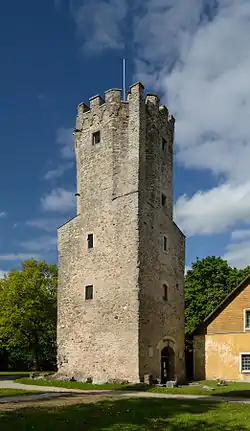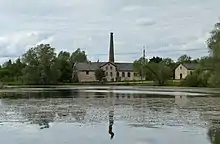Porkuni
Porkuni (German: Borckholm) is a village in Tapa Parish, Lääne-Viru County, in northern Estonia.[1] The settlement is located around the Lake Porkuni, which is the source of the Valgejõgi River.
Porkuni | |
|---|---|
Village | |
 Porkuni castle gatetower | |
| Country | |
| County | Lääne-Viru County |
| Parish | Tapa Parish |
| Time zone | UTC+2 (EET) |
| • Summer (DST) | UTC+3 (EEST) |
In 1944, the Battle of Porkuni was fought in the area.
Porkuni castle

In 1479, a castle was built on an island in the lake by the bishop of Tallinn Simon von der Borch. Porkuni castle (German: Schloss Borkholm) was a four-sided structure surrounding a central courtyard, where a small church stood. In each corner of the castle stood a cannon-tower, and there was also a gate tower which is still preserved, albeit with a few later alterations. Judging from the remains, the castle was built in different stages and the walls were gradually made higher.[2]
The castle was destroyed during the Livonian War.

In 1870–74, a new manor house was built at the site by the landowner at the time, Otto Ludwig von Rennenkampff. Perhaps not surprisingly, it is built in a neo-Gothic style, with turrets and other details inspired by a romantic perception of the Middle Ages. The ceremonial rooms of the manor, on the first floor, have been restored. The interior also houses a wrought iron staircase and a noteworthy art nouveau cocklestove.[3][4] The manor house and grounds is now owned by UK telecommunications operator aql.[5]
See also
References
- Classification of Estonian administrative units and settlements 2014 (retrieved 28 July 2021)
- Viirand, Tiiu (2004). Estonia. Cultural Tourism. Kunst Publishers. pp. 131–132. ISBN 9949-407-18-4.
- Sakk, Ivar (2004). Estonian Manors - A Travelogue. Tallinn: Sakk & Sakk OÜ. p. 158. ISBN 9949-10-117-4.
- Hein, Ants (2009). Eesti Mõisad - Herrenhäuser in Estland - Estonian Manor Houses. Tallinn: Tänapäev. p. 139. ISBN 978-9985-62-765-5.
- "Britid huvituvad Porkuni mõisast". Virumaa Teataja (in Estonian). 2017-10-11. Retrieved 2019-09-11.
- Krahe, Friedrich-Wilhelm (2000). Burgen des deutschen Mittelalters. Grundriss-Lexikon (in German). Flechsig. p. 694. ISBN 3-88189-360-1.
